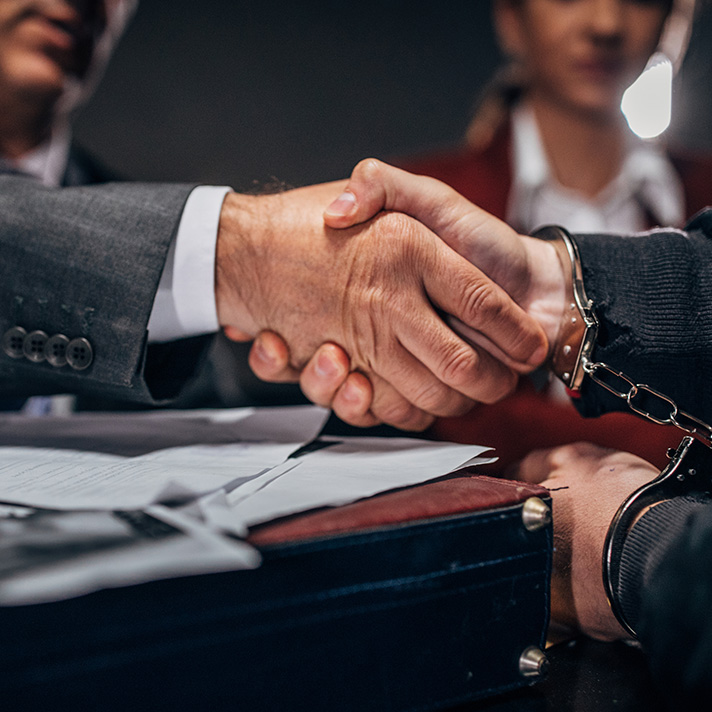DUI Defense in Baton Rouge
DUI charges in Louisiana carry serious consequences, including fines, license suspension, mandatory alcohol education, and possible jail time. Louisiana’s “per se” law means you can be charged with DUI if your blood alcohol content (BAC) is 0.08% or higher, regardless of impairment. For first-time offenders, diversion programs may offer alternatives to criminal convictions, but these options can be complex without proper legal guidance.
Additionally, Louisiana DUI penalties increase with subsequent offenses, including longer license suspensions, higher fines, and mandatory jail time. Refusing a breathalyzer test can lead to automatic penalties, such as a one-year license suspension.
Our team of criminal defense lawyers is well-versed in Louisiana’s DUI laws and the Baton Rouge court system. We carefully review each situation for potential defenses, such as errors in the arrest process or issues with sobriety tests, to determine the best way forward.
Understanding the intricacies of DUI charges is essential for a successful defense. We delve into the technicalities of the case, examining the calibration of breathalyzers and the legality of stops. Our comprehensive analysis can uncover procedural errors or rights violations, offering opportunities for dismissal or reduced charges. Additionally, we guide clients through options for regaining their driving privileges and mitigating the impact on their everyday life.
Theft, Shoplifting, & Robbery Charges in Baton Rouge
Theft, shoplifting, and robbery charges can have lasting consequences, not only in the form of legal penalties but also on your personal reputation and future job prospects. Whether you’re facing a misdemeanor shoplifting charge or more serious robbery allegations, these offenses carry heavy penalties that can impact your future. The penalties for theft, shoplifting, and robbery can include fines, restitution, probation, and even imprisonment, depending on the severity of the offense and whether it’s classified as a misdemeanor or felony. Aggravating factors, such as the use of a weapon in a robbery, can lead to more severe sentences.
We carefully examine the details of the situation, including how the evidence was obtained and whether there are any aspects of the prosecution's case that can be questioned. Our focus is on identifying options that may reduce the charges or offer alternatives to minimize the impact on your future.
Tackling theft-related charges requires attention to detail and a strategic approach. We collaborate closely with clients to understand their side of the story, and we may work with investigators to gather additional evidence or eyewitness accounts. By highlighting discrepancies in witness testimonies or questioning the manner in which evidence was seized, we aim to build a robust defense. Additionally, we discuss the potential for settlements or community service as alternatives to incarceration, always considering the best interest of our clients.
Assault Charges: What You Need to Know
In Louisiana, assault and battery charges can range from simple assault, where harm is threatened, to aggravated assault or battery, which involves the use of a weapon or intentional harm to another person. Battery charges involve physical contact and can lead to more severe consequences, including jail time, fines, and a lasting criminal record. Even if no serious injury occurred, the charge itself can have significant consequences on your life, impacting everything from your personal relationships to your career prospects. A conviction could lead to long-term consequences, including difficulties in obtaining certain licenses or certifications required for specific jobs or professional advancement.
Whether you're facing misdemeanor or felony charges, we carefully examine all aspects of your case. Factors like self-defense, mutual combat, or provocation may be relevant in crafting a defense strategy. Additionally, we look at any potential issues with the prosecution’s evidence or how the case was handled by law enforcement that could affect the outcome. The goal is to minimize the impact of the charges on your future and provide you with a strong defense throughout the legal process.
Assault cases demand careful scrutiny and effective negotiation. Our approach involves dissecting police reports, cross-examining witnesses, and highlighting any discrepancies in the reporting and arrests made. If self-defense or another mitigating factor is applicable, we vigorously argue these points to safeguard our client’s future. By tirelessly advocating on behalf of our clients, we seek reduced charges, lighter sentencing, and in some cases, complete acquittal. Moreover, we provide support outside the courtroom, assisting clients in maintaining employment and personal relationships during the proceedings.
Juvenile Offenses: Protecting Your Child’s Future
When a child or teenager faces criminal charges, the stakes are high, and the emotional strain can be overwhelming for both the child and their family. Juvenile offenses, such as drug charges, underage DUI, or theft, carry significant consequences that can affect your child’s future. Unlike adults, minors are often offered different legal avenues focused on rehabilitation rather than punishment.
We approach juvenile cases with care and compassion, aiming to protect your child’s future and minimize the impact on their education and future opportunities. Our team works with families to explore diversion programs, counseling, and other alternatives that can help your child avoid a criminal conviction.
Juvenile defense requires a delicate balance of assertiveness and empathy. We understand the unique pressures facing young clients, including peer influences and educational concerns. We actively engage with the court to seek rehabilitation-focused resolutions and provide guidance on community programs that advocate for a second chance. With a comprehensive understanding of the juvenile justice system, we strive to secure favorable results that enable youths to move past their mistakes and cultivate brighter futures.
Understanding Criminal Law in Louisiana
The legal system in Louisiana is unique compared to other states because it follows a civil law system instead of common law. This distinction affects criminal defense procedures and requires local legal knowledge to navigate effectively. For instance, in Baton Rouge, it's crucial to understand local jury tendencies, courtroom protocols, and how judges typically approach sentencing. Having a legal team that is deeply familiar with these aspects can make a significant difference in the outcome of a criminal defense.
Baton Rouge is subject to Louisiana's specific statutes, which can differ significantly from other regions. For example, certain offenses may carry different weight and penalties based on local regulations. Our role is to dissect these intricacies and use them to your advantage. By maintaining strong community ties and up-to-date legal knowledge, we provide defense strategies that are not only rooted in legal theory but also practical applications tailored to the area.
Frequently Asked Questions About Criminal Defense
What Is the First Step After Being Charged with a Crime?
The first step after being charged with a crime is to contact a qualified criminal defense attorney as soon as possible. Having legal representation early in the process is crucial to ensure your rights are protected from the moment you are charged. An attorney will guide you on what to say and do to avoid incriminating yourself, assist you in understanding the nature of the charges, and begin formulating a defense strategy. It's also important to gather any documents, evidence, or witness information that might be relevant to your defense and share these with your attorney. Prompt action allows your lawyer to investigate the charges thoroughly, advise you on potential plea deals, and prepare for the possibility of trial. Delay in securing legal representation can lead to unfavorable outcomes; hence, quick contact with an attorney plays a vital role in the defense process.
How Do Bail and Bond Work in Baton Rouge?
In Baton Rouge, as in the rest of Louisiana, bail is set by the court to ensure that a defendant returns for their court dates. The bail amount is influenced by the seriousness of the charges and the defendant’s past criminal record. If you cannot afford the full bail amount, you can work with a bail bondsman, who will cover the majority of the bail in exchange for a percentage of the total amount. It's important to understand that using a bail bondsman means you won’t get the percentage back, even after appearing at trial. Additionally, comprehending your bail conditions is crucial as any violations can result in being taken back into custody until your trial date. An attorney can provide guidance on bail options and conditions, possibly negotiating for a reduction in bail amount or arguing for a release on personal recognizance based on specific circumstances.
What Are My Rights After an Arrest in Louisiana?
After an arrest in Louisiana, you are entitled to certain constitutional rights regardless of the charges you face. These include the right to remain silent, the right to an attorney, and the right to be informed of the charges against you. Exercising your right to remain silent is crucial as anything said can be used against you in court. Requesting an attorney before responding to any police inquiry ensures protection during interrogations and questioning. It is also important to note that you have protections against unlawful searches and seizures; any evidence obtained in violation of these rights may potentially be suppressed in court. Having a knowledgeable attorney to advise you on these rights and ensure they are upheld is an integral part of an effective defense strategy and can affect the outcome of your legal proceedings.
What Happens During a Criminal Trial in Baton Rouge?
A typical criminal trial in Baton Rouge progresses through several stages. Initially, the case is presented with opening statements from both the prosecution and defense, outlining their respective arguments. Evidence is then presented, including witness testimonies, which are subject to cross-examination by both parties. After evidence examination, closing arguments provide a summary of each side’s case. The judge instructs the jury on the relevant legal standards and how to apply them to the facts. Finally, the jury deliberates to reach a verdict. If found guilty, sentencing follows, where arguments for punishment severity or leniency are presented. Throughout these processes, the role of your attorney is vital—they not only advocate for you but also challenge evidence, represent your interests in negotiations, and ensure that legal protocols are adhered to, which can greatly influence the trial's outcome and your future.
Can a Criminal Record Be Expunged in Louisiana?
Expungement in Louisiana enables individuals to have their criminal records erased or sealed from public view, which can significantly benefit those seeking employment or housing. However, not all offenses are eligible for expungement. Typically, misdemeanors may be expunged after five years from the date of conviction, and some felonies after ten years, but eligibility also depends on completing all terms of the sentence, including probation. Certain serious offenses, like sex crimes and violent felonies, are often not eligible. Navigating the expungement process involves filing a petition and attending a court hearing, where a judge considers the request based on compliance and behavior since conviction. Having legal assistance during this process ensures the accuracy of your petition and can help argue your case for why the expungement should be granted, thereby providing relief and a fresh start for your future endeavors.





